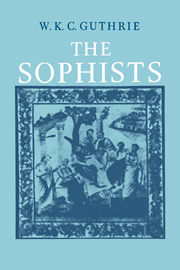Book contents
- Frontmatter
- Contents
- List of Abbreviations
- Preface
- I INTRODUCTION
- II TOPICS OF THE DAY
- III WHAT IS A SOPHIST?
- IV THE ‘NOMOS’ – ‘PHYSIS’ ANTITHESIS IN MORALS AND POLITICS
- V THE SOCIAL COMPACT
- VI EQUALITY
- VII THE RELATIVITY OF VALUES AND ITS EFFECTS ON ETHICAL THEORY
- VIII RHETORIC AND PHILOSOPHY (Seeming and being, believing and knowing, persuading and proving)
- IX RATIONALIST THEORIES OF RELIGION: AGNOSTICISM AND ATHEISM
- X CAN VIRTUE BE TAUGHT?
- XI THE MEN
- Bibliography
- Index of passages quoted or referred to
- General Index
- Index of selected Greek words
- Frontmatter
- Contents
- List of Abbreviations
- Preface
- I INTRODUCTION
- II TOPICS OF THE DAY
- III WHAT IS A SOPHIST?
- IV THE ‘NOMOS’ – ‘PHYSIS’ ANTITHESIS IN MORALS AND POLITICS
- V THE SOCIAL COMPACT
- VI EQUALITY
- VII THE RELATIVITY OF VALUES AND ITS EFFECTS ON ETHICAL THEORY
- VIII RHETORIC AND PHILOSOPHY (Seeming and being, believing and knowing, persuading and proving)
- IX RATIONALIST THEORIES OF RELIGION: AGNOSTICISM AND ATHEISM
- X CAN VIRTUE BE TAUGHT?
- XI THE MEN
- Bibliography
- Index of passages quoted or referred to
- General Index
- Index of selected Greek words
Summary
‘To describe is to select; to select is to evaluate; to evaluate is to criticize.’
Gouldner, Enter Plato, 168.The Presocratic philosophers dealt to a large extent with questions which might be said to have been settled long ago, and to possess now an interest which is purely historical. We no longer debate whether the earth is round or flat, and if we want to discover the origin and substance of the stars, we are hardly likely to be helped by the speculations of Xenophanes or Anaxagoras. With the change that came over philosophy in the fifth century, we are plunged into a discussion of questions which are as relevant now as they were when first raised by the Sophists. Whatever we may think of the Sophistic movement, we must all agree that (as Alban Lesky puts it in his history of Greek literature) no intellectual movement can be compared with it in the permanence of its results, and that the questions which the Sophists posed have never been allowed to lapse in the history of Western thought down to our own day. This is obvious from many recent writings on the period, in which the conflict between the Sophistic and Platonic points of view is expounded, even by professional scholars, in tones not so much of dispassionate historical investigation as of vehement partisanship. It is difficult to remain impartial in discussing questions which are of such vital importance to the preservation of civilized values in our own day.
In spite of the shift of interest from natural phenomena to human affairs, there are nevertheless essential connexions between the Pre-socratic tradition and the new intellectual ferment generated by the Sophists. The Presocratics may fairly be said to have been pre-occupied with the nature of reality and its relation to sensible phenomena.
- Type
- Chapter
- Information
- A History of Greek Philosophy , pp. 3 - 13Publisher: Cambridge University PressPrint publication year: 1977

